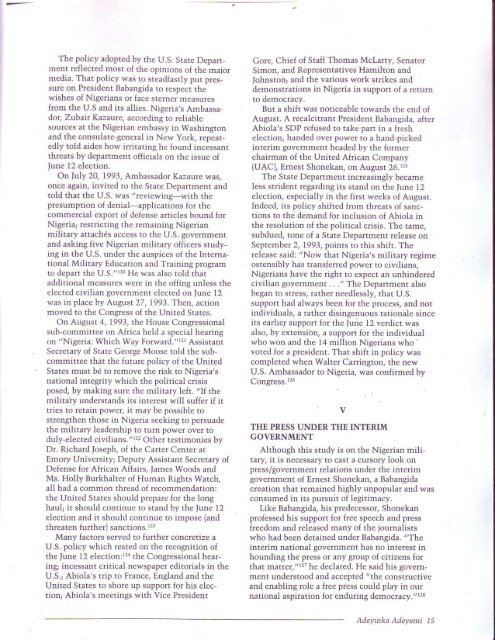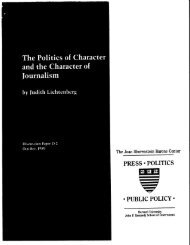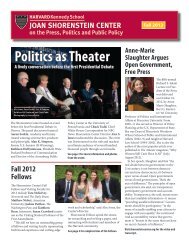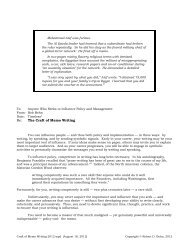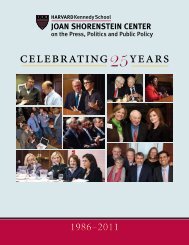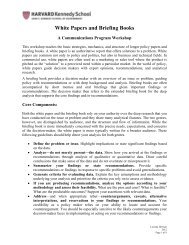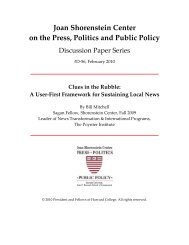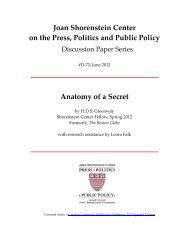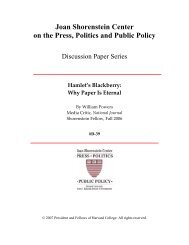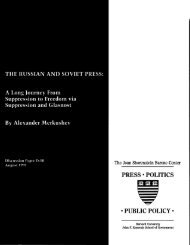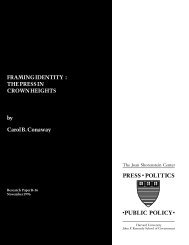The Nigerian Press Under the Military - Joan Shorenstein Center on ...
The Nigerian Press Under the Military - Joan Shorenstein Center on ...
The Nigerian Press Under the Military - Joan Shorenstein Center on ...
You also want an ePaper? Increase the reach of your titles
YUMPU automatically turns print PDFs into web optimized ePapers that Google loves.
<str<strong>on</strong>g>The</str<strong>on</strong>g> policy adopted by <str<strong>on</strong>g>the</str<strong>on</strong>g> U.S. State Department<br />
reflected most of <str<strong>on</strong>g>the</str<strong>on</strong>g> opini<strong>on</strong>s of <str<strong>on</strong>g>the</str<strong>on</strong>g> major<br />
media. That policy was to steadfastly put pressure<br />
<strong>on</strong> President Babangida to respect <str<strong>on</strong>g>the</str<strong>on</strong>g><br />
wishes of <str<strong>on</strong>g>Nigerian</str<strong>on</strong>g>s or face sterner measures<br />
from <str<strong>on</strong>g>the</str<strong>on</strong>g> U.S and its allies. Nigeria,s Ambassador,<br />
Zubafu Kazaure, according to reliable<br />
soulces at <str<strong>on</strong>g>the</str<strong>on</strong>g> <str<strong>on</strong>g>Nigerian</str<strong>on</strong>g> embassy in Washingt<strong>on</strong><br />
and <str<strong>on</strong>g>the</str<strong>on</strong>g> c<strong>on</strong>sulate-general in New York, repeatedly<br />
told aides how irritating he found incessant<br />
threats by department officials <strong>on</strong> <str<strong>on</strong>g>the</str<strong>on</strong>g> issue of<br />
|unb 12 electi<strong>on</strong>.<br />
On |uly 20,1993, Ambassador Kazaure was,<br />
<strong>on</strong>ce again, invited to <str<strong>on</strong>g>the</str<strong>on</strong>g> State Department and<br />
told that <str<strong>on</strong>g>the</str<strong>on</strong>g> U.S. was "reviewing-with<br />
<str<strong>on</strong>g>the</str<strong>on</strong>g><br />
presumpti<strong>on</strong> of denial-applicati<strong>on</strong>s for <str<strong>on</strong>g>the</str<strong>on</strong>g><br />
commercial export of defense articles bound for<br />
Nigeria; restricting <str<strong>on</strong>g>the</str<strong>on</strong>g> remaining <str<strong>on</strong>g>Nigerian</str<strong>on</strong>g><br />
military attach€s access to <str<strong>on</strong>g>the</str<strong>on</strong>g> U.S. government<br />
and asking five <str<strong>on</strong>g>Nigerian</str<strong>on</strong>g> military officers studying<br />
in <str<strong>on</strong>g>the</str<strong>on</strong>g> U.S. under <str<strong>on</strong>g>the</str<strong>on</strong>g> auspices of <str<strong>on</strong>g>the</str<strong>on</strong>g> Internati<strong>on</strong>al<br />
<str<strong>on</strong>g>Military</str<strong>on</strong>g> Educati<strong>on</strong> and Training program<br />
to depart <str<strong>on</strong>g>the</str<strong>on</strong>g> U.S."r20 He was also told that<br />
additi<strong>on</strong>al measures were in <str<strong>on</strong>g>the</str<strong>on</strong>g> offing unless <str<strong>on</strong>g>the</str<strong>on</strong>g><br />
elected civilian government elected <strong>on</strong> |une l2<br />
was in place by August 27, 1993. <str<strong>on</strong>g>The</str<strong>on</strong>g>n, acti<strong>on</strong><br />
moved to <str<strong>on</strong>g>the</str<strong>on</strong>g> C<strong>on</strong>gress of <str<strong>on</strong>g>the</str<strong>on</strong>g> United States.<br />
On August 4, !993, <str<strong>on</strong>g>the</str<strong>on</strong>g> Fiouse C<strong>on</strong>gressi<strong>on</strong>al<br />
sub-committee <strong>on</strong> Africa held a special hearing<br />
<strong>on</strong> "Nigeria: Which Way Forward."tzt Assistant<br />
Secretary of State George Moose told <str<strong>on</strong>g>the</str<strong>on</strong>g> subcommittee<br />
that <str<strong>on</strong>g>the</str<strong>on</strong>g> future policy of <str<strong>on</strong>g>the</str<strong>on</strong>g> United<br />
States must bd to remove <str<strong>on</strong>g>the</str<strong>on</strong>g> risk to Nigeria's<br />
nati<strong>on</strong>al integrity which <str<strong>on</strong>g>the</str<strong>on</strong>g> political crisis<br />
posed, by making sure <str<strong>on</strong>g>the</str<strong>on</strong>g> military left. "If <str<strong>on</strong>g>the</str<strong>on</strong>g><br />
military understands its interest will suffer if it<br />
tries to retain power/ it may be possible to<br />
streng<str<strong>on</strong>g>the</str<strong>on</strong>g>n those in Nigeria seeking to persuade<br />
<str<strong>on</strong>g>the</str<strong>on</strong>g> military leadership to turn power over to<br />
duly-elected civilians."r23 O<str<strong>on</strong>g>the</str<strong>on</strong>g>r testim<strong>on</strong>ies by<br />
Dr. Richard |oseph, of <str<strong>on</strong>g>the</str<strong>on</strong>g> Carter <str<strong>on</strong>g>Center</str<strong>on</strong>g> at<br />
Emory University; Deputy Assistant Secretary of<br />
Defense for A-frican Affairs, fames Woods and<br />
Ms. Holly Burkhalter of Human Rights Watch,<br />
all had a comm<strong>on</strong> thread of recommendati<strong>on</strong>:<br />
<str<strong>on</strong>g>the</str<strong>on</strong>g> United States should prepare for <str<strong>on</strong>g>the</str<strong>on</strong>g> l<strong>on</strong>g<br />
haul; it should c<strong>on</strong>tinue to stand by <str<strong>on</strong>g>the</str<strong>on</strong>g> |une 12<br />
electi<strong>on</strong> and it should c<strong>on</strong>tinue to impose (and<br />
threaten fur<str<strong>on</strong>g>the</str<strong>on</strong>g>r| sancti<strong>on</strong>s. la<br />
Many factors served to fur<str<strong>on</strong>g>the</str<strong>on</strong>g>r c<strong>on</strong>ctetize a<br />
U.S. policy which rested <strong>on</strong> <str<strong>on</strong>g>the</str<strong>on</strong>g> recogniti<strong>on</strong> of<br />
<str<strong>on</strong>g>the</str<strong>on</strong>g> |une 12 electi<strong>on</strong>:124 <str<strong>on</strong>g>the</str<strong>on</strong>g> C<strong>on</strong>gressi<strong>on</strong>al hearing;<br />
incessant critical newspaper editorials in <str<strong>on</strong>g>the</str<strong>on</strong>g><br />
U.S.; Abiola's trip to France, England and <str<strong>on</strong>g>the</str<strong>on</strong>g><br />
United States to shore up support for his electi<strong>on</strong>,<br />
Abiola's meetings with Vice President<br />
Gore, Chief of Staff Thomas McLarty, Senator<br />
Sim<strong>on</strong>, and Representatives Hamilt<strong>on</strong> and<br />
]ohnst<strong>on</strong>; and <str<strong>on</strong>g>the</str<strong>on</strong>g> various work strikes and<br />
dem<strong>on</strong>strati<strong>on</strong>s in Nigeria in support of a return<br />
to democracy.<br />
But a shift was noticeable towards <str<strong>on</strong>g>the</str<strong>on</strong>g> end of<br />
August. A recalcitrant President Babangida, after<br />
Abiola's SDP refused to take part in a fresh<br />
electi<strong>on</strong>, handed over power to a hand-picked<br />
interim government headed by <str<strong>on</strong>g>the</str<strong>on</strong>g> former<br />
chairman of <str<strong>on</strong>g>the</str<strong>on</strong>g> United African Company<br />
(UAC), Ernest Sh<strong>on</strong>ekan, <strong>on</strong> August 26.r2s<br />
<str<strong>on</strong>g>The</str<strong>on</strong>g> State Department increasingly became<br />
less strident regarding its stand <strong>on</strong> <str<strong>on</strong>g>the</str<strong>on</strong>g> June 12<br />
electi<strong>on</strong>, especially in <str<strong>on</strong>g>the</str<strong>on</strong>g> first weeks of August.<br />
Indeed, its policy shifted from threats of sancti<strong>on</strong>s<br />
to <str<strong>on</strong>g>the</str<strong>on</strong>g> demand for inclusi<strong>on</strong> of Abiola in<br />
<str<strong>on</strong>g>the</str<strong>on</strong>g> resoluti<strong>on</strong> of <str<strong>on</strong>g>the</str<strong>on</strong>g> political crisis. <str<strong>on</strong>g>The</str<strong>on</strong>g> tame,<br />
subdued, t<strong>on</strong>e of a State Department release <strong>on</strong><br />
September 2,1993, points to this shift. <str<strong>on</strong>g>The</str<strong>on</strong>g><br />
release said: "Now that Nigeria's military regime<br />
ostensibly has transferred power to civilians,<br />
<str<strong>on</strong>g>Nigerian</str<strong>on</strong>g>s have <str<strong>on</strong>g>the</str<strong>on</strong>g> right to expect an unhindered<br />
civilian goyemment. . ." <str<strong>on</strong>g>The</str<strong>on</strong>g> Department also<br />
began to stress, ra<str<strong>on</strong>g>the</str<strong>on</strong>g>r needlessly, that U.S.<br />
support had always been for <str<strong>on</strong>g>the</str<strong>on</strong>g> process, and not<br />
individuals , a ra<str<strong>on</strong>g>the</str<strong>on</strong>g>r disingenuous rati<strong>on</strong>ale since<br />
its earlier support for <str<strong>on</strong>g>the</str<strong>on</strong>g> |une 12 verdict was<br />
also, by extensibn, a support for <str<strong>on</strong>g>the</str<strong>on</strong>g> individual<br />
who w<strong>on</strong> and <str<strong>on</strong>g>the</str<strong>on</strong>g> 14 milli<strong>on</strong> <str<strong>on</strong>g>Nigerian</str<strong>on</strong>g>s who'<br />
voted for a president. That shift in policy was<br />
completed when Walter Carringt<strong>on</strong>, <str<strong>on</strong>g>the</str<strong>on</strong>g> new<br />
U.S. Ambassador to Nigeria, was c<strong>on</strong>firmed by<br />
C<strong>on</strong>gress.r26<br />
THE PRESS UNDER THE INTERIM<br />
GOVERNMENT<br />
v<br />
Although this study is <strong>on</strong> <str<strong>on</strong>g>the</str<strong>on</strong>g> <str<strong>on</strong>g>Nigerian</str<strong>on</strong>g> military,<br />
it is necessary to cast a cursory look <strong>on</strong><br />
press/government relati<strong>on</strong>s under <str<strong>on</strong>g>the</str<strong>on</strong>g> interim<br />
government of Ernest Sh<strong>on</strong>ekan, a Babangida<br />
creati<strong>on</strong> that remained highly unpopular and was<br />
c<strong>on</strong>sumed in its pursuit of legitimacy.<br />
Like Babangida, his predecessor, Sh<strong>on</strong>ekan<br />
professed his support for free speech and press<br />
freedom and released many of <str<strong>on</strong>g>the</str<strong>on</strong>g> journalists<br />
who had been detained under Babangida. "<str<strong>on</strong>g>The</str<strong>on</strong>g><br />
interim nati<strong>on</strong>al government has no interest in<br />
hounding <str<strong>on</strong>g>the</str<strong>on</strong>g> press or any group of citizens for<br />
that matter t't127 he declared. He said his govemment<br />
understood and accepted "<str<strong>on</strong>g>the</str<strong>on</strong>g> c<strong>on</strong>structive<br />
and enabling role a free press could play in our<br />
nati<strong>on</strong>al aspirati<strong>on</strong> for enduring democracy. " r28<br />
Adeyinka Adeyemi 15


